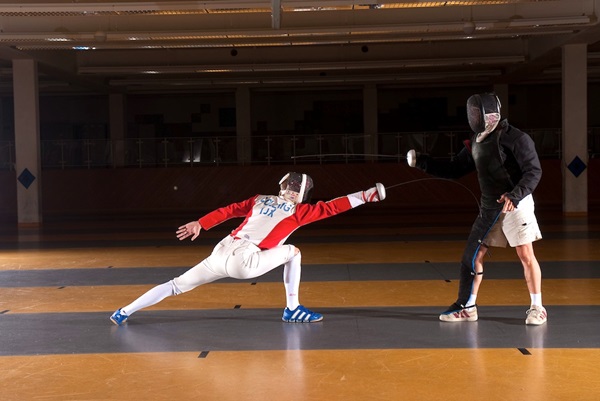 Credit: Cercle d’Escrime de Luxembourg
Credit: Cercle d’Escrime de Luxembourg
In the latest in a series of articles about sports clubs in Luxembourg, Chronicle.lu had the opportunity to speak with Michel Colling, Maître d'Armes from the Cercle d’Escrime de Luxembourg to learn more about the local fencing club.
The focus of this series is on sports which are less often covered in the news, yet have strong links with the international community in the Grand Duchy. Some are already well-established; others are relatively new.
Chronicle.lu: Why and when was your sports club established?
Michel Colling: Cercle d’Escrime de Luxembourg was founded in 2002, even though its origins go back to 1954 with the creation of the fencing club of the armed forces. Cercle d’Escrime de Luxembourg is based at the National Fencing Centre in Limpertsberg, Luxembourg City. There are three weapons in fencing – the epée, the foil and the sabre. Each one has its own rules. In Luxembourg, epée is in the majority.
The club currently has 73 members: 22 of whom are women.
Chronicle.lu: What are some of the links your club has with the international community in Luxembourg?
Michel Colling: Our fencers come from all four corners of the world! Most of the fencing classes are taught in French, but English, German and Luxembourgish are widely spoken.
Chronicle.lu: What activities, coaching and training programmes does your club offer and who is your main target audience or age group? Do you offer different levels for beginners and experienced athletes?
Michel Colling: Classes are held twice a week and split into two age groups. Training takes place on Mondays and Wednesdays. For fencers under the age of fifteen, it is from 17:00 to 19:00 and from 19:00 to 21:00 for everybody else.
From the age of eight years, the club welcomes boys and girls. Fencers compete on an equal footing, which is rare in sport. International tournaments and competitions are segregated by gender.
The structure of fencing competition allows for new fencers to access small competitions early on. Fencers also have the chance to compete either as individuals in their own age category or one category up, or even in team competitions.
Chronicle.lu: What are your club's main goals and objectives, both in terms of sports and community involvement?
Michel Colling: The Cercle d’Escrime de Luxembourg wishes to increase its membership and to take part in more international competitions. The club is also looking to increase sponsorship to extend the services that it can offer to its members.
Fencing requires a good deal of mental agility – probably more than any other sport, but along with that, fencing also requires power, balance, dexterity and motor skills. All this adds up to it being a surprisingly tactical sport (not for nothing, it is sometimes referred to as “chess on the planche”). With good technique and training, as well as the right equipment, fencing injuries are very rare.
Chronicle.lu: How has this sport grown in Luxembourg over the years?
Michel Colling: There have been fencing clubs in Luxembourg for many years; the first club was established in 1954 for the armed forces. There are currently six clubs in the Grand Duchy.
Luxembourg has produced several Olympic fencers, such as Collette Flesch, Romain Manelli, Alain Anen, Remo Manelli, Jean-Paul Olinger and Robert Schiel. Currently Luxembourg’s Flavio Giannotte is ranked 46th in the world and on track for the Olympics!
Chronicle.lu: What are some of the benefits of playing this particular sport?
Michel Colling: Fencing is a sport that develops an individual physically and mentally. Fencers develop superior eye-hand coordination, speedy reflexes and excellent endurance. On the mental side, students learn how to analyse an opponent for strengths and weaknesses and then counter them by using their own skill set. Fencing is excellent for honing concentration, precision, confidence, tactics, speed, flexibility, balance, dedication, and the ability to win and lose gracefully.
Chronicle.lu: What events, tournaments or competitions is your club participating in or hosting in 2024?
Michel Colling: Many of our members compete regularly in national and international tournaments – in Belgium, Germany and further afield. Some of our youngsters are off to Poland next month. Regular tournaments are organised within the club.
Chronicle.lu: How can someone interested in joining your club become a member? Are there any membership fees or other requirements?
Michel Colling: Even if you don’t have the equipment and you just want to try out before becoming a club member, you are more than welcome! Visit our website – www.escrimeluxembourg.lu - for our contact information and do not hesitate to get in touch with us! If you decide that you wish to join the club, there is an annual membership fee to pay.

Michel Colling, Maître d'Armes from the Cercle d’Escrime de Luxembourg








